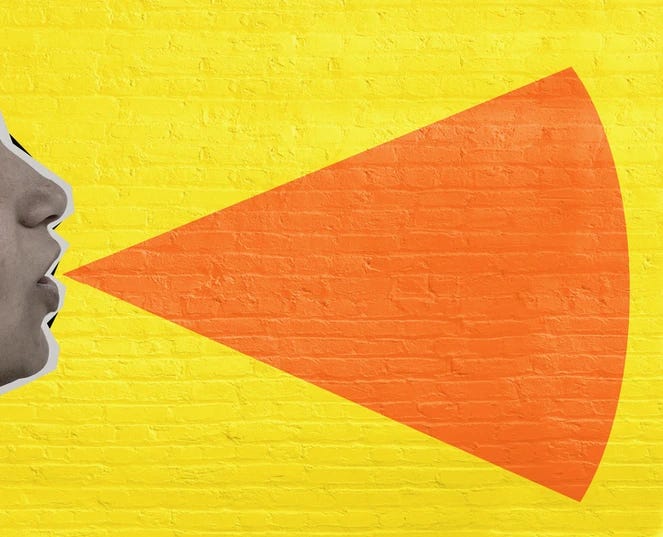"Few tragedies can be more extensive than the stunting of life, few injustices deeper than the denial of an opportunity to strive or even to hope, by a limit imposed from without, but falsely identified as lying within."
Stephen Jay Gould, from the
The Mismeasure of Man
There’s a new article from long covid advocacy and I’m not sure they’ve quite got it right/needs tightening on the using of terms and arguments
I’m putting this under this comment and reply because both of these are highly applicable to the sorts of things coming to my mind. And as we have to be coordinated enough not to be undermine a strong cohesive argument across all with using the same terms in weaker things that they are less descriptive of there is an issue.
eg it wastes calling ‘weaponising mental health’ on someone using the ‘anti-mental health’ trope. I think there’s a term like projection or distraction which is really what this is when it’s used. In fact the part 2 of this article (titled weaponising cognitive therapies
https://longcovidadvocacy.substack.com/p/behind-the-biological-veneer-a-closer) uses this term fine/consistently with this need and issue. Its talking about then actually having weaponised inappropriately things under a fake claim of them being ‘mentally health’ (not harm using psych techniques to ‘re-educate’ not based on things healthy to the patient) .
So this latest using of the same term to fop something else (the topic is eg interviews like decodeME if someone says ‘it’s not all in the mind’ etc) I think needs to not use this if it is going to stick with its suggestion of offering food of ‘maybe we’d like psych support’ and ‘maybe chronic illness does affect mental health’ etc. But I think we need to move beyond all of that pacifying thinking it’s helpful and doesn’t just make the listener think there’s not that big an issue (because I can tell you laypersons aren’t hearing the rest, so saying this just gives airtime to us making their case for them and people think we are being offered nice supportive stuff and alls fine, it’s just some don’t like the stigma - so no that’s concealing the issue).
So I think wasting the term (and then not being able to use it accurately for the extremely serious stuff we need it for) needs to be adapted. Firstly for what we all probably are relating to and thinking of when the quote above is being read by us.
Worse, I don’t know if yet those with LC have had as many seriously intimidated coerced threatened and silenced by these powers directly or indirectly yet. Like clinic’s writing strange notes so watch out when you say whether something helped or not etc. All the way to sectioning and DOLS but we know only tip of iceberg in how common and serious it is for me/cfs and it’s bad enough before you think of how the most vulnerable would have disappeared and never heard of as they don’t have family in their side etc.
When that term of weaponising mental health I think must be preserved for the actual weaponising of the powers implicit and that come with the mental health powers people can be coerced by and that’s been used to impose or deny treatment but also to undermine the word of people.
I also as time has gone on have more of a problem with people thinking the strategy of saying ‘we know mental health support is a good thing’ and ‘of course chronic illness can cause mental health issues’ etc to soppify to this.
When to actually play the rhetoric right we need to not get woven further into the myths and their stories for fear of nonsense about anti-mental health accusations that should be seen as weak and just need us to work harder in tightening up a better reply for not compromising on. It doesn’t help. It leads a path in to just be given some ‘mental health for coping’ ‘cos there’s no real treatment’ being the latest excuse for the same behaviour and leaves patients under the same inappropriate power distribution that doesn’t come with other illnesses not under this.
Of course it’s not undermining those with depression or schizophrenia to say the mental health tactics for me/cfs have been inaccurate , harmful and used to gain advantage over and silence patients. That’s just childish bps stirring the pot with those who are open of vulnerable to being told fibs that another is ‘saying things about you’
I think we also have to remember with all their anti-mental health nonsense there is a lot that is wrong with the uk industry. That’s not saying there aren’t the odd good professionals of places for certain illnesses. But more comes out all the time of very bad and hidden or silenced situations that those running the sector never sorted out. It’s a tactic they use for this as well, twisting those rightfully critiquing some of those running the sector or with power in it or flagging huge problems in order to keep those who have mental health issues more safe and expect better treatment if them and protections also get that sort of one-liner back. And nothing could be further from the truth when they are just trying to make sure it is indeed something anytime who thinks they might need mental health support would not feel scared if but feel safe and like it was a sector making sure what it offered worked and matched with what someone had etc.
So I think they use they one-liners to close that down ‘people won’t seek help’ is another classic if someone points out bad provision if actors. Not true. Bad provision being able to be brought to light and if it was ever fixed is what’s behind that not those who have to drag it into the light of the public.

